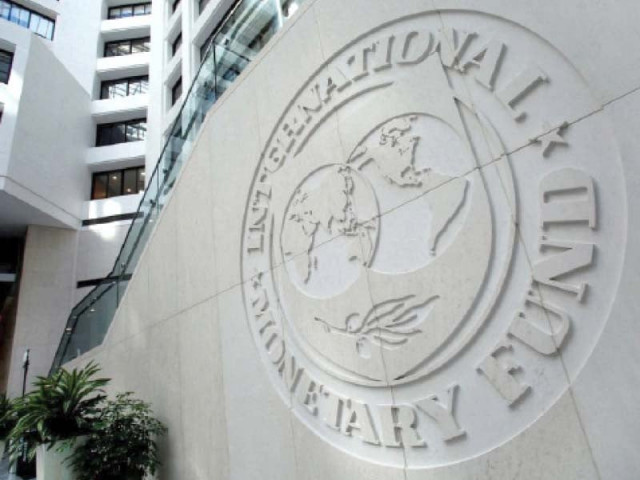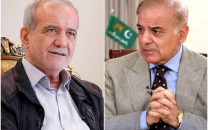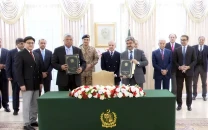IMF deal helps Pakistan avoid default
Govt under world pressure to not relax loan conditions

Pakistan has avoided the lingering default after the International Monetary Fund (IMF) on Thursday announced a staff-level agreement to extend the bailout package and increased its size to $7 billion, but the international community was still not letting up the pressure so that Islamabad stayed on course.
Background discussions with diplomatic channels revealed that the international community was standing behind the IMF all the time and did not give any chance to the government to walk away from the talks by not extending any kind of cash assistance to Pakistan.
All the friends of Pakistan had asked it to work with the IMF, according to diplomatic sources.
They added that the international community was constantly briefed by the IMF staff about the progress on the programme negotiations.
The disclosure by the diplomatic channels was also confirmed by the government sources, who told The Express Tribune that Saudi Arabia and the UAE had also advised Prime Minister Shehbaz Sharif to first take the IMF route.
Receiving no cash from Saudi Arabia, the UAE and Qatar was also surprising for the Sharif family that has historically cordial relations with the royal families of these countries.
The government sources said that this ended the chances for taking any popular decision despite fast erosion of the political capital of the ruling alliance.
However, those countries did help Pakistan avoid a default by extending billions of dollars loans that matured in the past six months but were further extended.
The diplomatic sources said that the IMF board of directors belonging to these countries had given assurances that they would not withdraw their existing bailouts.
There is tacit coordination that the international community will not let Pakistan -- as long as it stays on course -- to become Sri Lanka, where its president sent in his resignation after fleeing to Singapore amid mass protests over his country’s economic meltdown.
Nathan Porter, the IMF mission chief to Pakistan, said in a statement that the global lender’s team had reached a staff-level agreement with the Pakistani authorities for the conclusion of the combined seventh and eighth reviews of the Extended Fund Facility [EFF] supported programme.
The finance ministry on Wednesday was totally unaware about the timing of the IMF press statement. The ministry was intimated just two about two hours before the IMF announced the agreement early Thursday morning.
The global lender stated that Islamabad should stand ready to “take any additional measures”.
The IMF statement revealed that against the primary budget surplus target of Rs153 billion or 0.2% of the GDP set in the newly revised budget, the global lender has, in fact, given the 0.4% target.
To achieve it, the government may either require more revenue measures or will have to slash the expenditure, excluding that on development.
The review of Pakistan’s “anti-corruption institutions, including the National Accountability Bureau (NAB) has also been made part of the programme conditions", according to the IMF statement.
Prime Minister Shehbaz Sharif lauded the finance and foreign office teams led by ministers Miftah Ismail and Bilawal Bhutto-Zardari for their efforts in having the IMF programme revived.
He maintained that the revival of the programme would “set the stage to bring [the] country out of economic difficulties”.
The international community believes that Pakistan needs reforms under the IMF programme -- even more than its money.
According to the diplomatic channels, many people would think that Pakistan had been in a similar situation in 2018. However, they added that the situation was different this time, as there was less money available in the international markets.
Read Pakistan reaches staff-level agreement with IMF for $1.17bn loan tranche
The IMF has emphasised upon adhering to the budget passed by the National Assembly last month, which was also reinforced by the world capitals.
However, the previous government of the PTI had thrice backed off from the commitments that it had given to the IMF after availing the loan tranches.
The diplomatic sources said it was incumbent on Pakistan to change the narrative that it went off track after withdrawing the IMF loan tranche.
Last year, within days after withdrawing the loan tranche and successfully concluding the Eurobond transaction, the then finance minister was fired.
Shaukat Tarin came in and the programme went off track again, according to the diplomatic sources.
They said it was a wrong decision to cap fuel prices as even Europe and the US could not think of such actions.
When the case of Pakistan will go to the IMF board for approval, the question about the future course of action will be taken up.
The total access under the EFF is to reach $7 billion.
The IMF statement mentions that the staff-level agreement is subject to approval by the IMF’s Executive Board. Once it is approved by the board, about $1.177 billion (special drawing right [SDR] 894 million) of loan tranche will be released. This will bring the total disbursements under the programme to about $4.2 billion.
Finance Minister Miftah Ismail had, however, hoped to receive $2 billion.
The IMF’s decision to give only $1.2 billion after pushing Pakistan to swallow many bitter pills also indicates that the international creditors would keep Pakistan in a tight spot.
The IMF said that in order to support the programme implementation and meet the higher financing needs in the fiscal year 2022-23, as well as catalyse additional financing, its board will consider an extension of the EFF until end-June 2023 and augmentation of access by SDR 720 million or $1 billion.
Read Global economic outlook has ‘darkened’: IMF
The IMF said this would bring the total access under the EFF to about $7 billion.
The agreement with the IMF was reached only after the nation paid a heavy price in the shape of Rs249 per litre petrol price and Rs277 per litre high-speed diesel rates.
The taxes on the salaried class were also significantly increased to convince the global lender to agree on the staff-level agreement.
The previous government of the PTI had signed the 39-month EFF in July 2019 aimed at avoiding default on foreign repayment obligations.
However, the country remained in turmoil and despite remaining in the IMF programme, its foreign exchange reserves remained thin amid heightened external debt-related vulnerabilities.
Due to the faulty EFF programme design, unrealistic targets and lack of political commitment to implement what former premier Imran Khan had himself agreed to, the programme remained suspended for almost two out of three years.
The IMF statement underlined that “steadfast implementation of the FY2023 budget” was a critical element for the continuation of the programme.
“The budget aims to reduce the government’s large borrowing needs by targeting an underlying primary surplus of 0.4% of the GDP, underpinned by current spending restraint and broad revenue mobilisation efforts focused particularly on higher-income taxpayers,” IMF mission chief Porter said in the statement.
The primary budget surplus target is double than what the government had announced last month.
This may require more measures to achieve the sacrosanct goal.
However, a finance ministry official said that the 0.4% of the GDP target was with a fiscal adjuster. Without a fiscal adjuster it was Rs153 billion or 0.2% of the GDP, he added.
The IMF has made it clear that Pakistan would protect the “development spending” and create fiscal space for expanding social support schemes.
It added that the provinces had agreed to support the federal government’s efforts to reach the fiscal targets, and memoranda of understanding have been signed by each provincial government to this effect.
The IMF said on the back of weak implementation of the previously agreed plan, the power sector circular debt flow was expected to grow significantly to about Rs850 billion in the just-ended fiscal year, overshooting the programme targets, threatening the power sector’s viability and leading to frequent power outages.
It added that Pakistan was committed to resuming reforms, including, critically, the timely adjustment of power tariffs including the delayed annual rebasing and quarterly adjustments, to improve the situation in the power sector and limit outages.
Similarly, the IMF added that the recent monetary policy increase was necessary and appropriate.
“The monetary policy will need to be geared towards ensuring that inflation is brought steadily down to the medium-term objective of 5 to 7%. Importantly, to enhance monetary policy transmission, the rates of the two major refinancing schemes Export Financing Scheme and Long Term Financing Facility will continue to be linked to the policy rate.”
The global lender said greater exchange rate flexibility would help cushion activity and rebuild reserves to more prudent levels.
For reducing poverty and strengthening social safety, the IMF said during the current fiscal year, Pakistan had allocated Rs364 billion to the Benazir Income Support Programme (BISP) to bring nine million families into the safety net.
It added that Pakistan further aimed to extend the cheaper fuel scheme to additional non-BISP, lower-middle class beneficiaries.
The IMF said that in order to “improve governance and mitigate corruption, the [Pakistani] authorities are establishing a robust electronic asset declaration system and plan to undertake a comprehensive review of the anti-corruption institutions [including NAB] to enhance their effectiveness in investigating and prosecuting corruption cases”.
The global lender added that Pakistani “authorities should nonetheless stand ready to take any additional measures necessary to meet programme objectives, given the elevated uncertainty in the global economy and financial markets."



















COMMENTS
Comments are moderated and generally will be posted if they are on-topic and not abusive.
For more information, please see our Comments FAQ